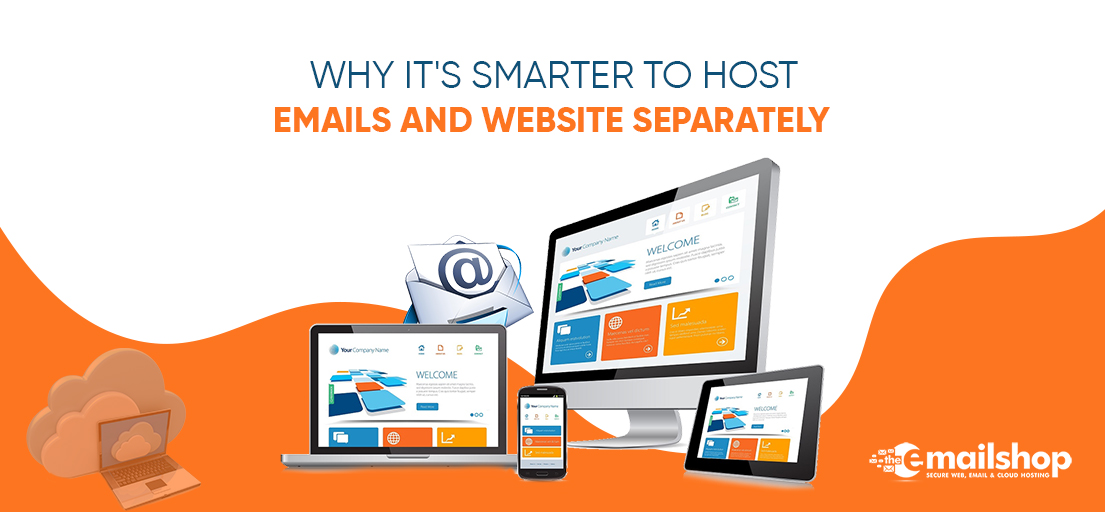Websites and email correspondence are crucial for individuals and businesses in today’s digital environment for several reasons. There are good reasons why it could be wiser to host your website and emails separately, even though it can seem more convenient to do so. It could seem sensible and effective to use the same service and location for your emails as well as your website.
But the reality is more complex. Putting all of your eggs in one hosting basket may increase the vulnerability of your company and reduce the potential that your supplier can supply. As a web hosting firm, email hosting is outside of our purview, but it’s not insurmountable. Our only objective is to provide you with and we don’t want to lessen that by experimenting with email hosting as well. The benefits of hosting websites and emails independently are examined in this article.
Why You Shouldn’t Host Emails and Websites on the Same Server
Hosting emails and websites on the same server can lead to performance issues, security vulnerabilities, and potential downtime. Email traffic can consume resources needed for website hosting, and if one service experiences a problem, it can affect the other. Additionally, if the server is compromised, both email and website data could be at risk. Separating them reduces these risks and enhances overall performance and security.
The Benefits of Hosting Emails and Websites Separately
Separating email and website hosting improves performance, reliability, and security. It allows for independent scalability and customization of each service. This setup ensures uninterrupted communication and enhances overall efficiency. Hosting emails and websites separately offers several benefits.
-
Enhanced Performance
When you host your emails and website separately, you can optimize resources for each service independently. Websites often require more processing power, bandwidth, and storage space compared to emails. Allocating specific resources to every function guarantees improved performance for your email system and website. The user experience is improved because of this isolation, which stops one service from affecting the functionality of the other.
-
Improved Reliability
The possibility of a single point of failure is decreased by hosting websites and emails separately. Your email correspondence won’t be impacted by maintenance, updates, or technical problems that cause your website to go down, and vice versa. By guaranteeing that vital communication routes continue to function even in the event of service interruptions, this separation improves overall reliability. Businesses can maintain uninterrupted operations and avoid potential loss of revenue or productivity.
-
Enhanced Security
Cyberattacks such as spamming, phishing, and virus distribution frequently target email systems. By hosting emails off your website, you may reduce the attack surface and make it more difficult for hackers to access both services at once. You can fortify defenses against cyberattacks by implementing specific security measures, such as web application firewalls, spam filters, and email encryption, for certain services.
-
Scalability and Flexibility
Separate hosting enables scalable growth for your website and email needs. As your website traffic increases or your email usage expands, you can independently upgrade resources or switch to more robust hosting solutions tailored to each service. Businesses may adjust to shifting needs to this flexibility without compromising dependability or performance. Separate hosting guarantees that your email system and website can both grow with your business, whether you’re expanding online or starting a new marketing campaign.
-
Greater Control and Customization
More control and customization choices are available when emails and websites are hosted independently. Select specialized hosting companies that provide cutting-edge email or website hosting capabilities, like spam filtering, content delivery networks (CDNs) for websites, email encryption, and tools for optimizing web pages. To this extent of customization, businesses can modify their hosting environments to suit their requirements and tastes.
-
Compliance and Regulatory Requirements
Certain firms are subject to stringent legal, financial, and healthcare regulations about privacy and data protection. Organizations can more easily adhere to industry-specific regulations when their websites and emails are hosted independently. Sensitive patient data sent via email, for example, might need to be encrypted and kept on secure servers that abide by HIPAA laws. Businesses can maintain regulatory compliance while maintaining the operation and security of both services by keeping email and website hosting separate.
-
Disaster Recovery and Data Redundancy
Better data redundancy and disaster recovery plans are made possible by hosting websites and emails separately. Having distinct hosting environments guarantees that important data and communication channels stay available in the case of a hardware malfunction, natural disaster, or cyberattack. Data replication, failover systems, and off-site backups are examples of service-specific redundancy and backup strategies that businesses can put into place. This redundancy guarantees business continuity even in the case of unanticipated disruptions and reduces the risk of data loss.
Read More: How to Buy the Best Business Email Hosting For Your Business
Connect With The Email Shop
It is highly recommended to keep your domain name and website hosting separate. If you need any suggestions on reliable providers for either of them, please feel free to contact us. We are always happy to assist you. In case you need a virtual assistant to help you set up your website and hosting, please reach out to the email shop, and we will match you with the perfect support.
For Discount and Offers, Visit our Official Twitter Page









